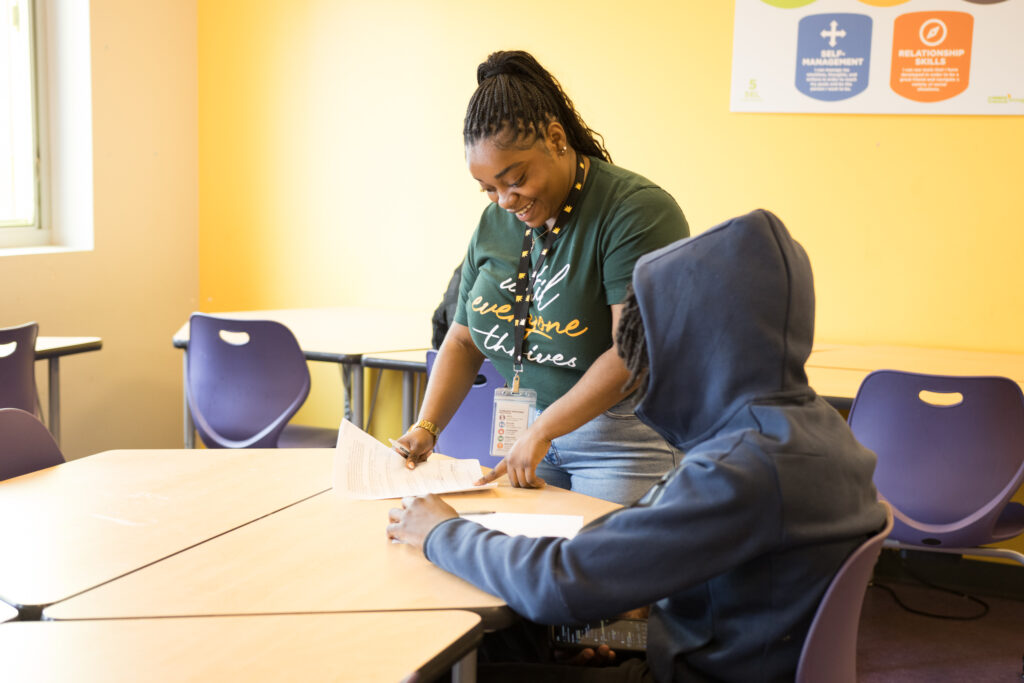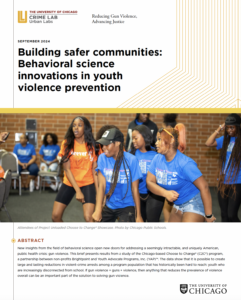Youth Violence
Gun violence is the leading cause of death for young people in America. But youth violence interventions can help keep kids safe and reach those who are the hardest to reach.
America’s gun violence problem is having an outsized impact on the most vulnerable members of our society — our kids. Fundamental disparities in public safety mean that children and young people live in communities that are disproportionately exposed to violence. Consistent exposure to gun violence has detrimental effects on mental health, emotional development, and academic engagement. For example, our research suggests that 38% of school-aged girls in Chicago public high schools citywide exhibit signs of PTSD — double the probability of PTSD in service members returning from Iraq and Afghanistan. Undoing decades of disinvestment won’t happen overnight, but we need to find ways to keep kids safe and reach those who are hardest to reach.
The Crime Lab partners with local schools, community violence intervention programs, and criminal justice agencies to connect young people with behavioral and mental health supports to help them navigate difficult situations, boost academic involvement, and reduce violence involvement.
Choose to Change, a program focused on gang-involved youth, found participants had 48% fewer violent crime arrests.
Our evaluation of Becoming a Man found the program helped cut violent-crime arrests in half and boost high school graduation rates by nearly 20%.
Back to Our Future (B2OF)
Back to Our Future (B2OF) is a state-funded, district-led, evidence-informed effort to re-engage disconnected students at an elevated risk for gun violence involvement.

Choose to Change®
The Choose to Change® program combines trauma-informed therapy with wraparound supports and aims to reduce youth violence while improving educational outcomes outside of an institutional setting.

CVI Leadership Academy
The Community Violence Intervention Leadership Academy is designed to deepen the leadership and management practices of senior CVI leaders so they can effectively manage community-based organizations and implement CVI strategies at scale.

Juvenile Intervention and Support Center (JISC)
The Crime Lab supports the Department of Family and Support Services (DFSS) in its efforts to evaluate and improve the Juvenile Intervention and Support Center (JISC), a prototype facility designed to divert children from the justice system and support their development.


Longer-Term Impacts of a Youth Behavioral Science Intervention: Experimental Evidence from Chicago
This paper details updated results from a study of Choose to Change® (C2C®), a trauma-informed cognitive behavioral therapy and intensive mentoring program developed by nonprofits Brightpoint and Youth Advocate Programs, Inc. (YAP).

Choose to Change® (C2C®) Program Guide
This program guide is intended for community-based organizations working to fill gaps in services and reach an underserved population of youth impacted by violence and trauma.

Building safer communities: Behavioral science innovations in youth violence prevention
This policy brief highlights results from a large-scale randomized controlled trial that evaluated the impact of Choose to Change® (C2C®) on participants’ criminal justice involvement.

Unpacking the Impacts of a Youth Behavioral Health Intervention: Experimental Evidence from Chicago
This working paper details results from a study of Choose to Change® (C2C®), a trauma-informed cognitive behavioral therapy and intensive mentoring program developed by nonprofits Brightpoint and Youth Advocate Programs, Inc. (YAP).
Latest Updates
Chicago’s Homicides Are Headed for Lowest Tally in 60 Years
Kim Smith, the Crime Lab’s Director of National Programs, speaks with Bloomberg’s Miranda Davis about the 2025 declines in violent crime in Chicago.

Chicago looks to close out 2025 with a 10-year low in violent crime
The Crime Lab’s experts and end-of-year analysis of Chicago crime trends are heavily featured in the latest Crain’s Forum on violence reduction.

The Best Books of 2025
The New Yorker includes Crime Lab Pritzker Director Jens Ludwig’s book, “Unforgiving Places: The Unexpected Origins of American Gun Violence,” on its annual list of best books of the year.

